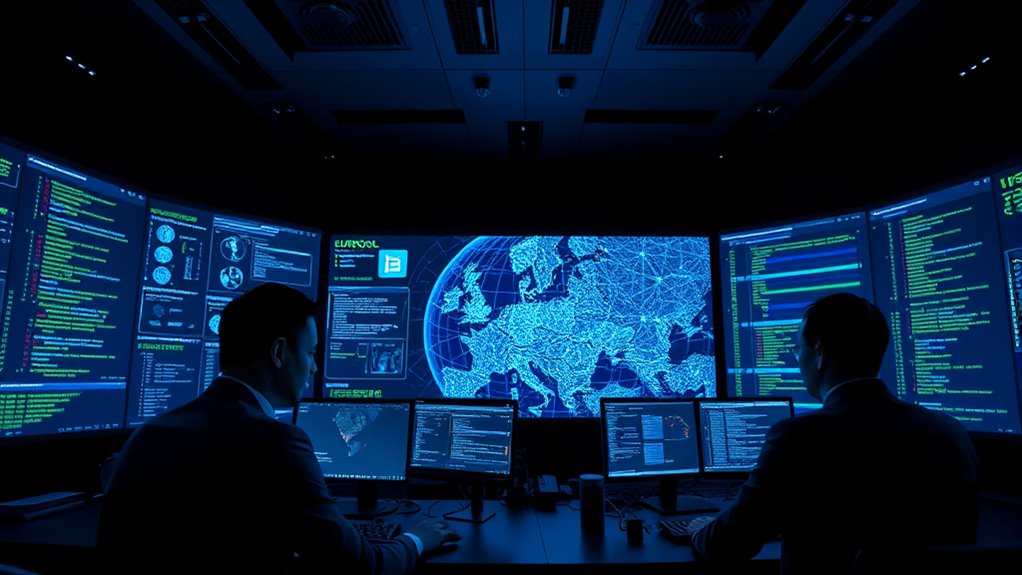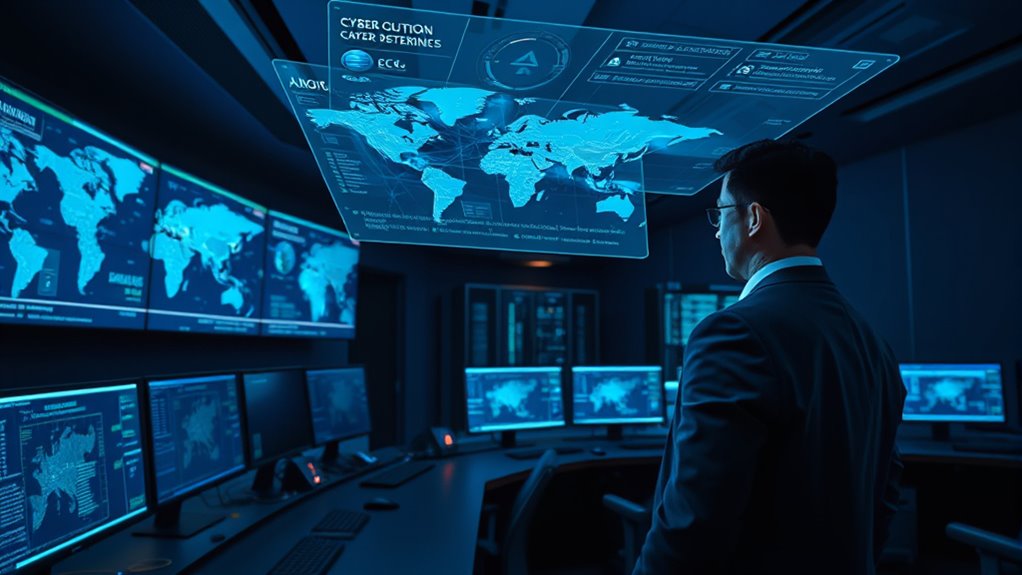Europol’s EC3 actively fights against nation-state hackers aiming to access and disrupt critical EU systems. They detect, analyze, and dismantle complex malware campaigns that threaten government, finance, and energy sectors. EC3 works closely with member states, private companies, and international partners to stay ahead of evolving cyber threats. Their efforts protect your digital life from covert espionage and attacks. Continue exploring to discover how EC3’s strategies guard the EU’s digital security every day.
Key Takeaways
- EC3 defends the EU by detecting, analyzing, and disrupting cyber espionage campaigns from nation-state hackers.
- It employs advanced malware detection and threat intelligence to identify covert cyber threats early.
- EC3 collaborates with EU member states, private sector, and international partners to coordinate countermeasures.
- The center focuses on dismantling cyber espionage networks targeting critical infrastructure and sensitive data.
- EC3’s efforts help safeguard the EU’s digital security, protecting government, financial, and energy sectors.

In an era where cyber threats from nation-states grow increasingly sophisticated, Europol’s European Cybercrime Centre (EC3) plays a essential role in defending the European Union. As you navigate the digital landscape, you might not always see the dangers lurking behind seemingly harmless emails or websites. But behind the scenes, state-sponsored hackers engage in cyber espionage, targeting government agencies, critical infrastructure, and private sector entities. These actors deploy complex malware campaigns designed not only to steal sensitive information but also to weaken the EU’s security posture. It’s a constant game of cat and mouse, with hackers refining their techniques and defenders striving to stay ahead.
EC3’s work involves detecting, analyzing, and disrupting these malicious activities. You may not realize it, but when you hear about a major data breach or a targeted attack, it’s often linked to the activities of nation-state hackers. These actors utilize a range of tools and tactics, from spear-phishing campaigns to sophisticated malware strains, to infiltrate networks. Malware campaigns are particularly dangerous because they can remain dormant for long periods, quietly gathering intelligence or creating backdoors for future intrusions. EC3’s experts monitor these campaigns meticulously, collecting intelligence and sharing actionable insights across member states to prevent further damage. Additionally, the use of innovative malware detection techniques helps identify these threats early, reducing potential harm. Incorporating advanced threat intelligence practices is crucial for staying ahead of these evolving tactics.
EC3 detects and disrupts malware campaigns that secretly gather intelligence and create backdoors for future cyber attacks.
Furthermore, understanding cybersecurity trends is crucial for staying ahead of evolving threats. You benefit from EC3’s efforts every time a threat is neutralized before it reaches critical systems. The center uses advanced threat intelligence and international cooperation to dismantle cyber espionage networks and disrupt malware campaigns. When you think about the EU’s digital infrastructure—whether it’s government databases, financial systems, or energy grids—EC3’s work helps keep these essential sectors secure from infiltration. Their role isn’t just reactive; they proactively identify vulnerabilities exploited by nation-states, helping organizations strengthen defenses before an attack occurs.
Moreover, EC3 collaborates with private companies, law enforcement agencies, and international partners to build a thorough shield against these threats. This collective effort is essential because cyber espionage and malware campaigns often cross borders, making isolated responses ineffective. You can trust that the EU’s cybersecurity landscape is continuously evolving, thanks to EC3’s vigilant monitoring and strategic operations. By staying ahead of increasingly complex cyber espionage tactics, EC3 ensures that the EU remains resilient against the persistent and evolving threats posed by nation-state hackers. Their work is an indispensable line of defense, safeguarding your digital life and the stability of the union from covert cyber threats.
Frequently Asked Questions
How Does EC3 Coordinate With International Cybersecurity Agencies?
You’ll find that EC3 coordinates with international cybersecurity agencies through collaborative intelligence and information sharing. It actively partners with global organizations, exchanging threat data and best practices to bolster defenses against cyber threats. By participating in joint operations and leveraging international networks, EC3 guarantees a coordinated response to cyberattacks. This collaboration helps you stay ahead of nation-state hackers, protecting critical infrastructure and digital assets across borders.
What Are the Biggest Challenges EC3 Faces Against Nation-State Hackers?
Imagine your digital world under constant threat—that’s the challenge EC3 faces against nation-state hackers. They struggle with cyber espionage, where attackers steal sensitive info, and maintaining digital sovereignty amid evolving tactics. These hackers adapt quickly, making it hard for EC3 to stay ahead. Coordinating with global agencies helps, but the fast pace of innovation and geopolitical tensions keep the fight tough. Staying vigilant is essential to protect the EU’s digital borders.
How Is EC3 Funded for Its Cybersecurity Initiatives?
You might wonder how EC3 funds its cybersecurity efforts against cyber threats. EC3’s funding sources include the European Union budget, grants, and cooperation with member states. This financial support enables EC3 to develop advanced tools, share intelligence, and respond swiftly to cyber threats. By securing diverse funding, EC3 stays equipped to combat nation-state hackers effectively, ensuring the EU’s digital infrastructure remains protected and resilient against evolving cyber threats.
What Training Do EC3 Analysts Undergo?
You wonder what training EC3 analysts undergo to stay ahead of cyber threats. They pursue rigorous programs, earning cybersecurity certifications like CISSP and CEH, which sharpen their skills. They also explore advanced threat analysis techniques, learning to identify and counter sophisticated nation-state hackers. This intense training ensures they’re prepared for the ever-evolving cyber battlefield, combining practical expertise with cutting-edge knowledge to protect the EU’s digital borders.
How Does EC3 Measure Success in Its Operations?
You’ll find that EC3 measures success through effective threat detection and incident response. When they identify and neutralize cyber threats swiftly, it shows their operations are working. They track metrics like the number of cyber incidents resolved, the speed of response, and how well they prevent future attacks. Continuous improvement in these areas indicates their efforts are successful, helping protect the EU from sophisticated nation-state hackers.
Conclusion
As you see, Europol’s EC3 is crushing nation-state hackers like a relentless storm, safeguarding the EU’s digital borders. Their efforts aren’t just impressive—they’re a colossal shield protecting millions from the chaos of cyber warfare. With every cyberattack thwarted, they prove that no threat is too mighty to conquer. Stay vigilant and trust that EC3’s relentless fight keeps your digital world safer than ever—like a fortress guarding your every click.









